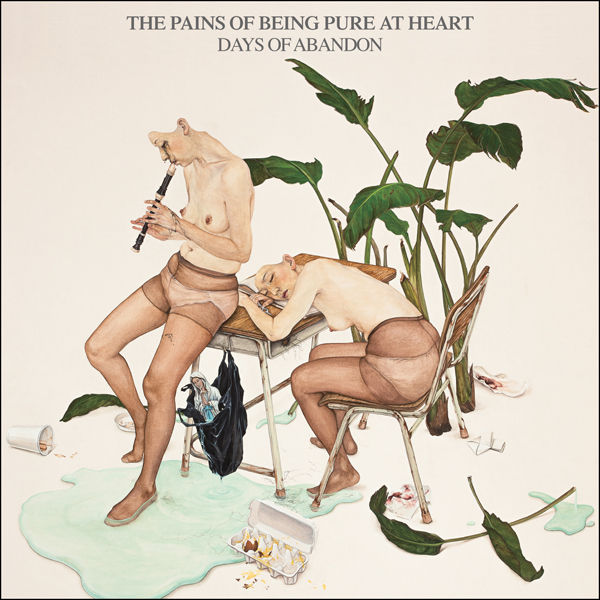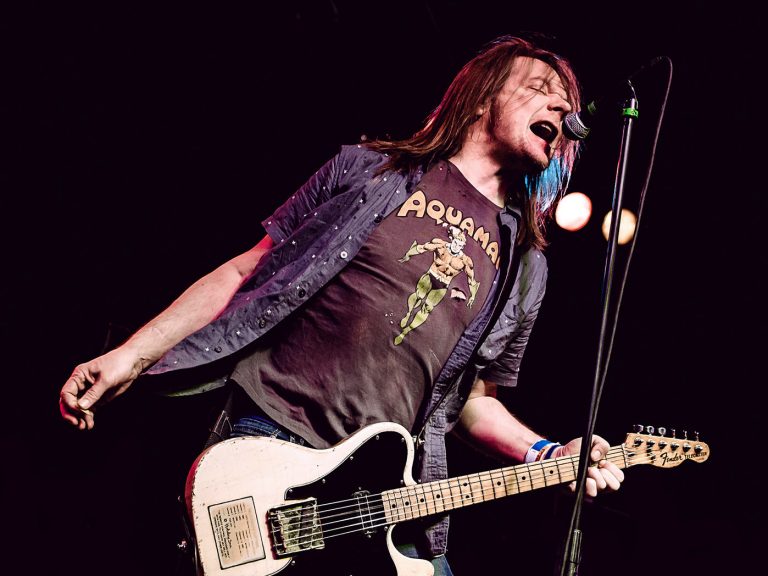

New York-based indie pop outfit, The Pains of Being Pure at Heart, have had a very busy year. They teamed up with a new record label, released their critically acclaimed third album, Days of Abandon, and tweaked their lineup. Not to mention, their single, “Simple and Sure,” was recently picked up by Hershey’s to be featured on one of the company’s latest commercials. Now the band has just embarked on a US tour and will be making their stop in Oxford on November 2nd to perform at Proud Larry’s with Jim Barrett.
It’s safe to say that The Pains of Being Pure at Heart are a band on the rise. I had the pleasure of speaking by phone with founding member, Kip Berman, from somewhere in the middle of Arizona, about everything from touring and songwriting, to the band’s success and our shared love of Sweden.
Your most recent record, Days of Abandon, is such a great album. Before we dig into the songs, can you tell me about the beautiful artwork you chose for the album cover?
The artwork was a painting by South Korean artist, Lee Jinjoo, whose work I came across several years ago. I was really struck by the beauty and strangeness of her disconcerting yet sensibly beautiful images. So we contacted her and worked out permission to use one of her works as the art for our new record.
 What inspired the title of the album?
What inspired the title of the album?
I wanted to capture a sense of aloneness, but the possibility of that aloneness as well. It wasn’t just isolation and despair, but also freedom and possibility. It was partly inspired by a novel called The Days of Abandonment. Instead of ‘abandonment,’ I used ‘abandon’ because it has a fuller meaning that could be seen in different ways: not just loss, but a sense of loudness and freedom as well.
The new record feels very emotionally dynamic, going quickly from heavy melancholy moments to moments of extreme joy and happiness. Was it a deliberate or thematic move to go for such a stark distinction of emotions as opposed to a nuanced one or simply an honest retelling of experiences?
It’s hard to say whether it was intentional or just a total retelling of the things we’ve gone through as a band. Having songs that reflect joy, but that are also more melancholy, is an accurate reflection of our own lives and probably an accurate depiction of anyone’s [life]. I don’t think anyone experiences pure unending joy. I also think that it may be false that anyone experiences unending misery … I always find that posture of the tormented artist to be very one-sided and reflecting a reality that at least I don’t live. No matter how much hardship there is you have to recognize that there are moments of clarity, joy, and beauty in life, too.
Days of Abandon is much quieter and softer than your second album, Belong, which was sonically pretty massive. Why did you decide to tone it down for this record?
Making Belong was a great experience, and we were very focused on capturing a vibrant, loud, and cathartic sound. We were trying to convey music through sheer sonic force, making everything heavier, louder, and bigger.
With this record, I was trying to convey the feeling and power of our music without the traditional expressions of rock power. I wanted to make powerful, moving, emotional music that reflected my life without simply relying on turning everything up to eleven and trying to make everything bigger and bigger. I love loud heavy music, but I really feel that we were able to make a record that was just as moving, if not more so, this time by focusing on the lyricism, melodies, and delicate touches that were able to convey emotions the way simply turning a guitar amp up might not have been able to.
As the primary songwriter, what is the developmental process when you get together with the band? Do the band members improvise and contribute their own ideas to the sound or do you like to stay true to the vision you initially have for each song?
I care deeply about the lyricism and the spirit of the music I write. I would never ask, nor want, anyone to contribute ideas for those aspects of the music. I’m also really aware that I’m not a genius at arranging different parts for people to play. I’m not an amazing drummer or keyboard player. There are talents and skills that other people bring. I’m completely grateful that I have friends that are talented at different aspects of music that can help take the songs I write and make them far better than if I just performed them by myself. I think there are some people that can write every single note that each instrument plays. But to me, one of the big ideals of the band is what the music says lyrically and what the band should express. So I don’t fixate over the minutia of [composition]. I’m really grateful that I collaborate with such talented people that can bring their own ideas.
The video for your single, “Until the Sun Explodes” is pretty fantastic. What made you go with an animated video instead of shooting a more traditional one?
Growing up, my favorite Saturday morning cartoon was always Jem and the Holograms. It’s about teenage girls who came from an orphanage and are transformed into rock stars by this computer called Synergy. I’ve always loved the transformative power of music. In your normal life, you might just be the person you are, which isn’t exceptional or terrible; you’re just like anyone else. But through music you can become something almost unreal or impossible. I wanted to do a Pains of Being Pure at Heart version of Jem and the Holograms in this video. I’m really excited about how it turned out. It was cool to see our identities turned into cartoons.
 Days of Abandon was just released in May, but can we expect any releases in the near future?
Days of Abandon was just released in May, but can we expect any releases in the near future?
We are putting out an EP of B-sides from the album this fall, called Abandonment Issues, songs that we recorded at the [same] time, but didn’t make the cut. There are four songs that people haven’t heard before that we’re putting out.
I heard that you were really into Swedish pop music. I’m sort of obsessed with Swedish culture myself. Why is the Swedish music scene important to you? Who are some of your favorite Swedish artists?
When we started the band, there was always the influence of what we listened to as teenagers growing up in America, which was heavy guitar, alternative sounds. But I also became really fascinated with Scottish and Swedish indie pop. Those are two very small countries that produce a lot of great bands. As far as Sweden goes, one of our favorite labels was called Labrador. They have some great bands like The Legend, Radio Department, and a new band from Gothenburg called Makthaverskan, which is an amazing, emphatic, indie pop band with a great woman singer. We were always really well received in Sweden, even before we were in America. We got a chance to do a tour of Sweden before we’d ever toured America. Some promoters asked if we would play some free shows if they bought us plane tickets. It was so exciting for us, and still is anytime we get to go to Stockholm, Malmo, or Gothenburg. We’ve always had great reception to our music in Sweden and we’ve always held a lot of Swedish Bands up as role models.
How would you describe a great show?
There’s nothing worse than that band that only plays their new songs. So we’re playing songs from the new album, but our older songs as well. People come to your music at different times in their lives and there is no shame in saying you like one particular album the best. So we try to play what we feel are the best songs from each record and put our hearts into our performance. If I’m not covered in sweat by the end of the show, I haven’t done a good show.
The Pains of Being Pure at Heart’s show at Proud Larry’s begins at 6:30 pm Sunday, November 2nd. Doors open at 5:30 pm. ![]()
–
This article was originally printed in The Local Voice #215 (published October 23, 2014).
To download the PDF of this issue, click here.


